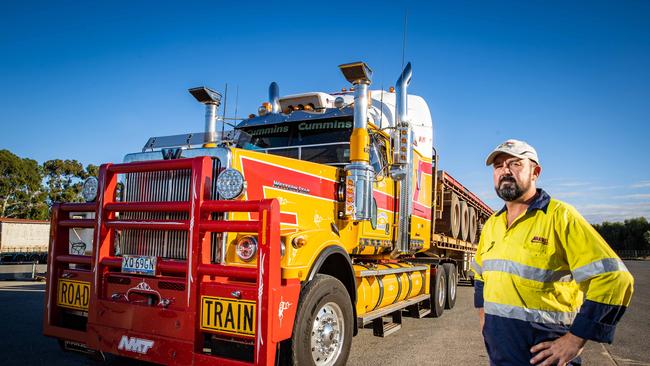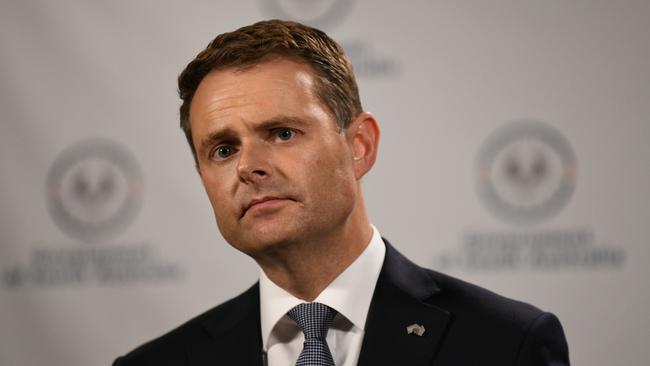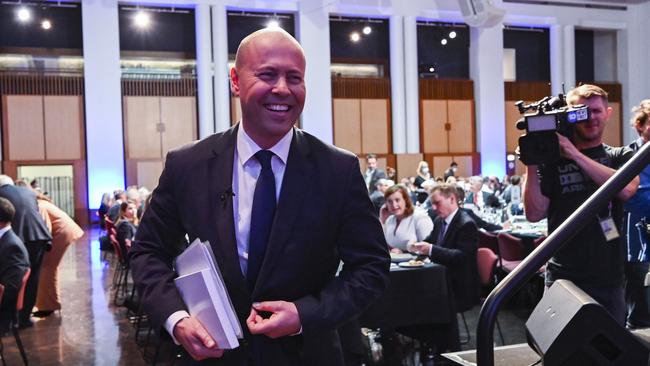Truckies warn budget fuel excise cut will drive up grocery bills
A budget measure designed to immediately slash petrol prices is going to push the price of other critical supplies through the roof, a key industry is warning.
SA News
Don't miss out on the headlines from SA News. Followed categories will be added to My News.
Grocery prices will rise after the fuel excise cut in the federal budget has left truckies worse off, the industry says.
South Australian Road Transport Association (SARTA) executive officer Steve Shearer says freight companies are the big loser from Tuesday’s budget, with the increased cost of fuel to be passed onto the everyday consumer in their weekly shopping bill after a vital diesel rebate was cut.
“The only way they’re going to be able to afford to make their payments is to charge the customer more in the first place,” he said.
“Everything you buy at the supermarket moves on multiple trucks … you’d be pushing up freight rates in a way that is going to be reflective on supermarket shelves.”
As well as increasing the price of the weekly shop, the cuts will mean freight companies are under pressure to keep themselves afloat.
“There are no ifs, buts or maybes about it – freight will go up,” he said.
“There’s no help for truck operators.
“We simply cannot afford to not have those funds available otherwise freight rates have to go up and it will be significant.”

Ahead of Tuesday’s budget, freight companies were hopeful the fuel excise would equal thousands of dollars in savings at the pump but Mr Shearer said operators would pay close to 20c more per litre for diesel after the government cut the Fuel Tax Credit rebate.
The rebate was a cashback of around 18c per litre on diesel before it was scrapped.
According to the federal government, heavy vehicle operators would receive a “net gain of 4.3c per litre” on diesel, but Mr Shearer said freight companies had been hit with a double-edged sword.
He said because of the government’s cut to the fuel excise trucking companies would need to reduce their fuel levy, normally applied to freight charges as a safety net to combat unpredictable fuel prices, as well as forfeit the 17.6c a litre cashback the rebate offered.
“Previously they’d get the 44c minus the road use charge so for every litre of fuel they would be banking 24c.
“If all they (the government) do is cut the fuel excise … the trucking industry is in trouble,” Mr Shearer said.
Mr Shearer said the issue was raised with the federal government as soon as SARTA became aware of it but no action had been taken yet.
Local truckie Darren Nicholas will save on his personal fuel bill but his employer Neil Mansell Transport will be one of the companies to feel the impact of the rebate reduction.
“Personally, at the moment it’s costing me $60-$70 a week just driving to and from work.”
Mansell Transport’s trips range from a 1000km round-trip up to 6000km, meaning thousands would be spent on higher fuel bills.
The Treasury provided a fuel excise fact sheet in response to The Advertiser’s request for comment but would not answer direct questions.
How will SA use its $900m extra GST?
By Gabriel Polychronis
South Australia is set to rake in a GST windfall worth $900m, as the federal government hands out billions in extra “top up” payments to protect states against its controversial changes to the carve-up.
According to latest budget papers, consumer spending will generate a $23bn GST haul over the next three financial years.
SA treasurer Stephen Mullighan said that under changes to the state’s GST share on Friday, that figure would be as high as $23.8bn over the next three years.
This is about $900m more than projected over the same period in December’s mid-year budget review.
Mr Mullighan warned against celebrating the extra revenue, explaining the national economy was still attempting to recover to pre-Covid revenue levels.
“We certainly won’t be looking at spending all of this additional revenue,” Mr Mullighan said.
“We’ve got a commitment to get the budget back into sustainable surpluses.”

There are concerns the state will be left high and dry once the federal government’s top up payments, helping the country adjust to the adjusted GST scheme, run out at the end of the 2025-26 financial year.
In 2018, a new GST “floor” was introduced, meaning all states could not receive less than 70c for every dollar of the tax it sends to federal coffers.
State treasurers around the country argue WA should earn less GST because of its ability to collect billions in mining royalties from high iron ore prices.
Ratings agency S&P predicts WA’s budget surplus to reach $8bn this year, raising questions about the fairness of the new deal.
The federal government has so far spent $5.2bn in top-up payments for states – $3.4bn more than it initially expected.
Mr Mullighan said he shared the “overall concern of all states and territories” that “in a few short years, we’re going to be losing our guaranteed GST funding”.
“The deal that was signed back in 2000 between John Howard and all state and territory governments at that time has been torn up by the current federal Coalition government,” he said.

Mr Mullighan said that without the top-up payments, SA would lose about $280m a year.
“So any benefit we get from the change in the (national) pool last night will be more than wiped out by the changes to the overall GST deal,” he said.
Treasurer Josh Frydenberg said the 2018 deal “righted a wrong”.
“It was wrong that the people of Western Australia could see just 30 cents in a dollar return to them in GST – that is wrong,” he said.
In his post-budget address, Mr Frydenberg said WA was enjoying a massive budget surplus due to its limited time spent in Covid lockdowns and current iron ore prices of $140 a tonne.




